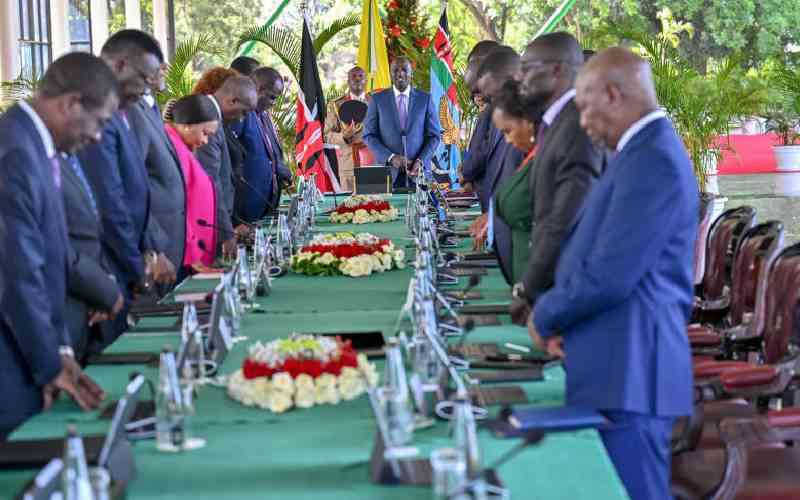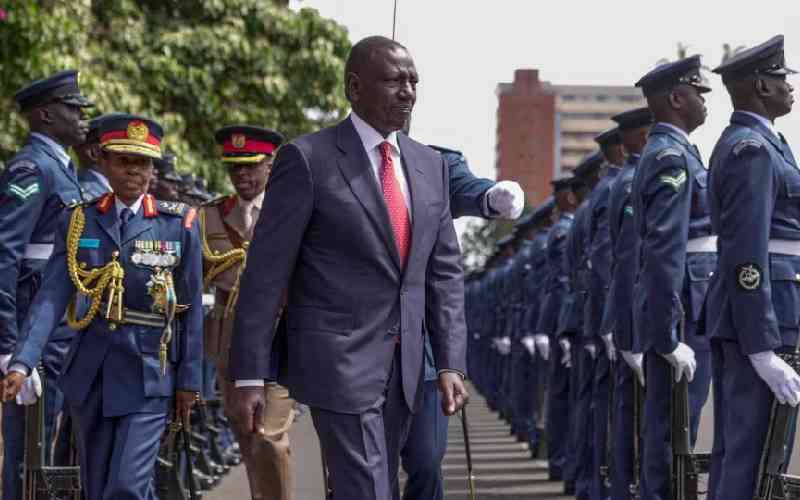Kenya will not earn royalties on its vast oil discoveries, according to leaked, but highly confidential production sharing agreements entered with foreign contractors, The Standard on Saturday can reveal.
This means the country could forfeit billions of shillings from the resource, unlike Uganda, which has pegged royalties at 12.5 per cent in all its contracts.
The real shocker could be on communities that host the oilfields like Turkana and Wajir counties because there are no provisions to allow them any portion of the earnings directly except for employment and discretional corporate social responsibility projects.
Government sources defended the oil contracts as “good”, but mineral experts paint a gloomy picture, arguing that Kenya may have received the short end of the stick. Recent legislation like the Mining Act, envisage how local communities would share in such natural resources, are, however, inapplicable in the oil industry.
The Standard on Saturday has found copies of the contracts entered around 2007 that, for the first time, sheds light on how the Government will share the new-found oil wealth with the contractors including US’ Camac Energy, UK’s Tullow Oil and Canada’s Taipan Resources.
“Our production sharing contracts do not have a clause on royalties; it is not something that we have been keen on,” Martin Heya, the commissioner for petroleum at the Energy ministry said.
Mr Heya defends the model saying the State would take at least 60 per cent share of the oil revenues in all contracts, in spite of any possible outcomes – and even without royalties. “We have good contracts; experts from the World Bank and IMF have told us so,” he argued.
None of the 40 contracts allow the State rights to royalties. Royalties could be a critical source of revenue for the State in the possible scenarios of low production and poor oil prices in the international markets.
Energy Principal Secretary Joseph Njoroge, says royalties notwithstanding, Kenya has contracts that ‘you cannot compare to any others’, adding that new laws are required to enable communities and counties share in the revenues earned by the national government.
“How communities will benefit does not affect the contracts in their current form, we are drafting laws that will guide the revenue sharing between national government, counties and communities,” Eng Njoroge says.
Kenya’s model contract was developed based on the Petroleum Act drafted in 1986, but has had various amendments. In all the amendments, however, royalties have not been included with the focus being ‘windfall profits’ tied to production levels and oil prices.
The State would only hope for high returns if specific thresholds in pricing and production are met.
Revenue sharing clauses for the existing contracts are solely dependent on the negotiating power and skills of the prospecting firm, and possibly the Energy minister’s personal biases, according to mining experts. It is only confidentiality clauses that are common among the different contracts.
Geologist and mining expert Prof Eric Odada says the confidentiality clauses are likely to cost the country ‘billions’ in losses.
“Why should the revenue sharing agreements be confidential while the resources are public?” Odada asks.
Stay informed. Subscribe to our newsletter
But Tullow Oil, which has interests in six blocks, says from its analysis, the State and the people would be the biggest beneficiaries from the way the agreements are structured and confidentiality was necessitated by the commercial interests of the various contractors.
Commercially confidential
“The contracts are commercially confidential. We cannot discuss the details; but the main beneficiaries of oil production in Kenya will be the people of Kenya through taxation and production sharing,” Tullow Oil’s Head of Corporate Communications George Cazenove said.
He acknowledged the different contract regimes across the countries that Tullow Oil has mining interests in, but maintains all the contracts will ‘ultimately be to the benefit of the people’.
“It really doesn’t matter whether a ‘Production Sharing Contract-regime’ contains a provision for royalties or not. What matters is that the mix of fiscal measures within a contract – taxes, production sharing and any other measures (and this mix sometimes includes royalties and sometimes doesn’t) – all come together to ensure a fair and equitable outcome for all parties including the people and government of the country involved and the investors,” Cazenove said.
Taipan Resources CEO Max Birley, who is based in Nairobi, was yet to get back to our enquiries by the time of filing this report. But whether to have royalties or not has not been a subject of debate in Uganda or even Nigeria – Africa’s largest oil producer.
While Uganda is yet to produce its first oil, and Nigeria has been a lead producer for decades, both have embraced the royalty regime.
Apart from the income tax provisions detailing how the companies will pay their taxes, specified by different laws, most of the other clauses are purely negotiated.
Even ‘signature fees’, which are payable when the contracts are signed, are arrived at from bargaining.
Heya said the fee is given as a token of appreciation by the contractor. “If a contractor agrees to give it to the State, we obviously would not decline,” he said.
Contract to explore
Canadian firm Lion Petroleum paid Sh20 million ($250,000) for the contract to explore and produce oil from Block 1, in Elwak – Wajir.
The contract was entered on November 19, 2007 with the then Energy Minister Kiraitu Murungi, now the Meru Senator.
In this contract, Lion was allowed to use 55 per cent of all crude oil recovered but not consumed within the operations - called cost oil, to recover its capital investment and direct production costs.
The remainder of the crude oil produced but not consumed, equal to 45 per cent, is called profit oil – where the State and contractor share on a proscribed schedule, again dependent on volumes produced.
Typical contracts allow the State a higher proportion of the profit oil with rising production, capped at 78 per cent for production in excess of 150,000 barrels per day.
For profit oil below 20,000 barrels, the government is entitled to 55 per cent of the profit oil.
Like Lion’s contract, all the others have been structured to ensure Kenya’s benefit from the reserves would be highly pegged on oil prices on the international markets staying above the reserve price of $50 throughout the 25-year long production contracts.
Given the fluctuations in the oil markets, driven by higher production by major oil producers, Kenya could be significantly exposed in a harsh environment since contracts are structured to give preference to the mining companies, which must recoup their costs first.
For example, current crude oil prices in the international markets have fallen below $80 per barrel – the lowest in over four years.
On Thursday, it was quoted at $77.52 with projections showing further falls owing to increased production by the major oil producing countries.
The prices have fallen about 30 per cent since June 2014, an example of the level of volatility in oil prices.
 The Standard Group Plc is a
multi-media organization with investments in media platforms spanning newspaper
print operations, television, radio broadcasting, digital and online services. The
Standard Group is recognized as a leading multi-media house in Kenya with a key
influence in matters of national and international interest.
The Standard Group Plc is a
multi-media organization with investments in media platforms spanning newspaper
print operations, television, radio broadcasting, digital and online services. The
Standard Group is recognized as a leading multi-media house in Kenya with a key
influence in matters of national and international interest.
 The Standard Group Plc is a
multi-media organization with investments in media platforms spanning newspaper
print operations, television, radio broadcasting, digital and online services. The
Standard Group is recognized as a leading multi-media house in Kenya with a key
influence in matters of national and international interest.
The Standard Group Plc is a
multi-media organization with investments in media platforms spanning newspaper
print operations, television, radio broadcasting, digital and online services. The
Standard Group is recognized as a leading multi-media house in Kenya with a key
influence in matters of national and international interest.








